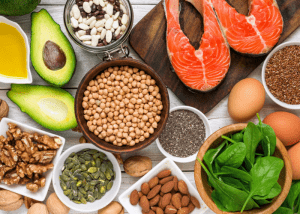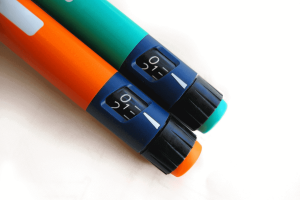The Skinny on Healthy Fats
One of the most commonly held weight-loss myths is that eating fat makes you fat. After all, it sounds logical, right? Fortunately, this bit of nutritional advice couldn’t be further from the truth. There are many “healthy fats” that should be in your diet!
According to the U.S. Centers for Disease Control and Prevention (CDC), adults should get 20-30 percent of their daily calories from fat. But that doesn’t mean you should just dig in on lots of butter-laden pastries! Read up on a few sources of healthy fats that you can work into your diabetes-friendly diet.
Polyunsaturated fats🐟
Fats that are good for your heart? It sounds too good to be true. However, when eaten in moderation, polyunsaturated fats–or PUFAs, for short–have been shown to reduce cholesterol levels, which can lower your risk of developing heart disease. So, what does a serving of PUFAs look like? The American Heart Association recommends loading up on fish (such as salmon, mackerel, and trout) for a heart-healthy meal. You can also sneak some extra PUFAs into your diet by snacking on nuts, soybeans, or flaxseed. Make sure to go easy on the portions, though–one small handful of nuts packs in more than 150 calories.
Monounsaturated fats🥜
According to the Mayo Clinic, monounsaturated fats, or MUFAs, are a prime weight-loss nutrient, since their filling properties help keep hunger pangs at bay. A diet rich in MUFAs has also been shown to relieve muscle pain and soreness–a helpful benefit for those beginning a new exercise routine. For a MUFA-rich snack, try dipping fresh-cut veggies in a tablespoon of low-sugar nut butter. Peanut and almond offer the most benefits.
Omega-3 fatty acids🍿
Omega-3 fatty acids are often overlooked when it comes to creating a healthy diet plan. But these heart-healthy fats offer numerous wellness benefits, from lowering blood pressure to improving symptoms of depression. According to WebMD, lean fish are the primary source of Omega-3s. For an easy meal or snack, try canned tuna or salmon in water. If you’re not a seafood fan, scope out your grocery store for foods that are fortified with Omega-3 fatty acids. Some brands of milk, peanut butter, and even popcorn come with an added boost of healthy fats.
Omega-6 fatty acids🥚
According to the Mayo Clinic, when eaten in moderation and in place of saturated fats, omega-6 fatty acids can be good for your heart. The American Heart Association recommends you keep it minimal with 5-10 percent of your daily calories coming from Omega-6 fatty acids.
Replacing saturated fat sources such as meat, butter, and cheese with plant-based foods that contain omega-6 fatty acids, including vegetable oils, nuts and seeds, will help meet recommendations. Another benefit seen from replacing saturated fats with omega-6 fatty acids is lower LDL cholesterol levels.
For a low-carb, portion-controlled snack, reach for a handful of sunflower or pumpkin seeds. Eggs are also an excellent source of Omega-6s. To cut back on calories, skip fried or scrambled eggs in exchange for hard boiled ones.

Summary
Not all fats are bad fats! Polyunsaturated fats, eaten in moderation, can reduce cholesterol levels which lowers your risk of developing heart disease. Monounsaturated fats have properties that will make you feel full for longer! Omega-3 fatty acids offer numerous benefits, from lowering blood pressure to improving symptoms of depression. Omega-6 fatty acids can be very good for your heart. In moderation, of course.
Disclaimer Statement: This is for educational purposes only and not intended as medical advice. For individual medical advice, contact your healthcare practitioner.




